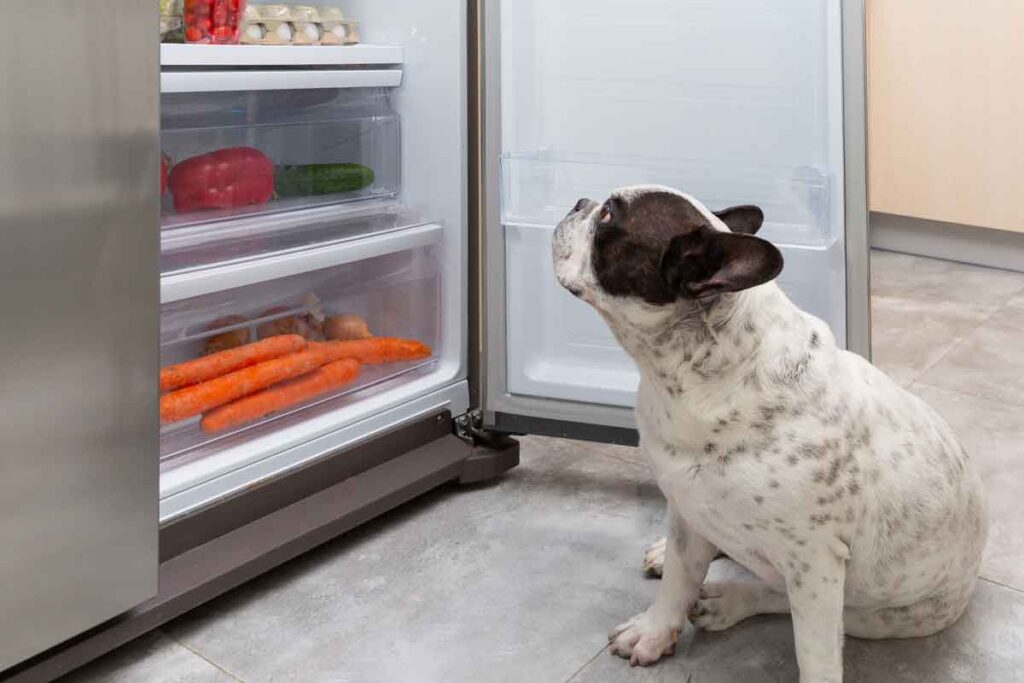For most home cooks, onion in all its forms is a staple of the kitchen. But if you’re the kind of person who is susceptible to puppy-dog-eyed pleas for food, you could be putting your dog at serious risk when feeding them morsels from your own plate. Onions contain a toxin that can cause serious, and even fatal, health risks to dogs.
Are onions bad for dogs?
Yes. Onions are toxic for dogs and should not be fed to them under any circumstance. All parts of the onion, including bulb, leaves, and juice are highly toxic. This includes onion in all its forms, whether raw or cooked, powdered, pressed, or dried. It’s a good idea to even fence off areas of vegetable gardens that contain onions and other alliums to avoid your dog having access to the plants.
Onions, or Allium cepa in botanical terms, contain a toxic compound called N-propyl disulfide, which causes oxidative damage to your dog’s red blood cells, according to the ASPCA. The toxin is an oxidizing agent that attaches itself to molecules in red blood cells, thereby reducing the cells’ capacity to carry oxygen around the dog’s body. It also sets off an immuno-response that signals to the body that the red blood cells are invaders, resulting in a process called hemolysis where red blood cells are destroyed. The end result is a serious and even life-threatening condition called hemolytic anemia.
How much onion is toxic to dogs?
Unfortunately, most dogs are opportunistic eaters who wouldn’t hesitate to snatch your onion rings if given the chance. Furthermore, onion powders or minced dried onion is even more potent for dogs, since the concentration per weight is higher once the water content has been removed — meaning even a dish with some onion seasoning can impact your pet’s health. According to The American Kennel Club, 100g of onion per 20kg of a dog’s weight can lead to toxic effects, meaning “a 45-pound dog would only have to eat one medium-to-large onion to experience dangerous toxicity levels.”
Per Pet MD guidance: onion poisoning is consistently observed in dogs who consume more than 0.5% of their total body weight. Pet owners be warned: alliums are even more toxic to felines, and given their relatively smaller size, even a minor dose can be toxic to your cat.
What about green onions or chives?
Onions belong to the genus Allium, which is toxic to dogs in its entirety. This includes all forms of bulb onions — red, white, yellow, sweet, Vidalia, etc. — as well as other Allium members like green onions or scallions, chives, shallots, leeks, and even garlic. All of these species, as delicious as they may be in human cooking, are highly toxic to your dog.
Symptoms of onion poisoning
The first clinical symptom of onion poisoning in your dog is most likely to be gastrointestinal distress, such as vomiting, drooling, diarrhea, and decreased appetite. The ASPCA also lists an elevated heart rate and panting as signs of potential onion toxicity. However, the more specific indications of onion-induced anemia may take longer to present as red blood cells are attacked and kidneys are affected. These include:
- Lethargy
- Fainting
- Red or brown urine
- Weakness
- Pale or yellow gums
Treating onion toxicity
If you noticed any of the symptoms listed above, or suspect your dog has ingested a significant portion of alliums, seek veterinary help as soon as possible. The vet will diagnose based on the symptoms and blood work. Hemolytic anemia or Heinz bodies detected on a blood smear in the wake of a suspected onion exposure will point to onion toxicity. Anemia can be caused by other triggers, so a correct diagnosis is essential.
Onion toxicity can be fatal, causing your pet’s kidneys and other major organs to fail. Speedy diagnosis and treatment are essential. Call your veterinarian, the Pet Poison Helpline at 855-764-7661, or the ASPCA Animal Poison Control Center at 888-426-4435 for advice on your next steps. If you are able to get your pet to the veterinarian within a couple of hours of ingestion, they may induce vomiting to expel the onions, followed by the administration of activated charcoal to decrease the absorption of toxins through the abdominal tract. Both processes should only be administered by a veterinarian.
If hemolytic anemia develops, your pup may need hospitalized care, where they may receive fluids intravenously, oxygen supplementation, or a blood transfusion.
When it comes to your dog’s health, prevention is the best medicine! Never feed your pet any foods that contain alliums in any form, even seasoning. Dispose of leftovers in sealed containers where your dog can’t access them, and keep plates of food out of reach of curious noses. If you keep a vegetable garden, fence off areas where onions, garlic, leeks, and chives are growing. Don’t assume your pet will be put off by the pungent scent or tear-inducing aromas.
Vegetables dogs can eat
While alliums are off the table, there are plenty of vegetables that are healthy in small amounts for dogs. Carrots are an excellent low-calorie snack alternative to processed treats, while pumpkin, peas, green beans, and cucumbers are all great additions that add nutrients, vitamins, and minerals to your dog’s diet.









